Respecting the human rights of applicants, and hiring based only on aptitude and ability, are principles stated in the Employment Security Act regarding employment selection. Due to this, it is not allowed for employers to gather information, or ask questions about candidates that have nothing to do with their aptitude or ability.
The Japan Trade Union Federation (JTUF) conducted a survey regarding job discrimination to investigate the facts regarding hiring processes. They announced the results on May 15th of this year. The survey was aimed at 1,000 male and female job seekers throughout Japan, aged 18 to 29, who in the past 3 years took either sought employment as a new graduate or as a mid-career hire.
According to the survey results, around 40% of respondents chose the option “I felt companies were filtering candidates based on academic background,” showing the importance placed on academic background in job hunting. Around 28% of respondents answered that “I felt gender discrimination while job hunting.” As for companies filtering candidates by academic background, that refers to candidates being sorted by their alma mater, and using that information to make a hiring decision.
Looking more closely at the survey results, respondents also answered that employers required candidates to send resumes using document templates unique to each company. 32.2% of high school graduates, as well as 58.0% of college and vocational school graduates, answered that this was the case.
High school graduates going through the hiring process use the “National High School Standardized Form” when applying to a company. For graduates of higher education, it’s recommended that they use a resume based on the JIS standard style.
 Have you been asked to submit application documents other than National High School Standardized Form during job hunting? (One answer allowed)
Have you been asked to submit application documents other than National High School Standardized Form during job hunting? (One answer allowed)Respondents: high school graduates
 Have you been asked to submit a resume that is not based on the JIS standard style during job hunting? (One answer allowed)
Have you been asked to submit a resume that is not based on the JIS standard style during job hunting? (One answer allowed)Respondents: college and vocational school graduates
In questions about submitted documents, 19.4% of respondents answered that companies asked them for their Certificate of Family Records or Certificate of Individual Records – neither of which companies can ask for as part of an employment screening. 48.6% of respondents answered that companies asked for a medical certificate.
 About documents being asked to submit during job hunting. (One answer allowed)
About documents being asked to submit during job hunting. (One answer allowed)For questions regarding information input in application documents or entry sheets, 91.2% responded that companies asked for their gender, and 56.4% responded that companies asked for their permanent address or place of birth. In addition, 35.9% were asked about their “family structure,” 21.8% were asked about their “residence and financial status,” 19.9% were asked for “a map of the area around their house and their living environment,” 15.8% were asked about their “family’s work and income,”12.3% were asked about “a person they respect,”4.0% were asked about their “political affiliation,” and 3.6% were asked about their “religion.”
All of this is private information unrelated to an applicant’s attitude, so it cannot be gathered during the hiring process.
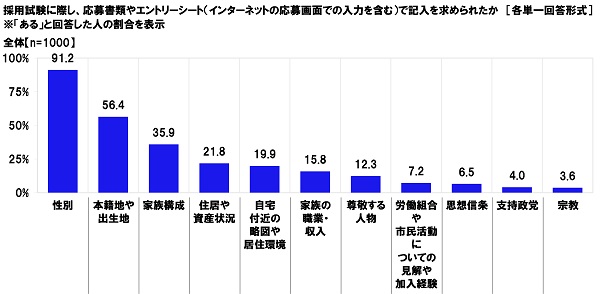 Questions being asked to input in application documents or entry sheets (includes online applications). (One answer allowed)
Questions being asked to input in application documents or entry sheets (includes online applications). (One answer allowed)*Shows peercentages among those who answered “yes.”
Following that were questions regarding job interview questions. The most common question, according to survey respondents, was regarding their ability to transfer to other company branches (42.3%). Next was “family structure” at 39.1%, “whether they could do overtime or work on days off,” at 34.7%, “permanent address and place of birth” at 31.6%, and “gender” and “person you respect” tied at 18.9%.
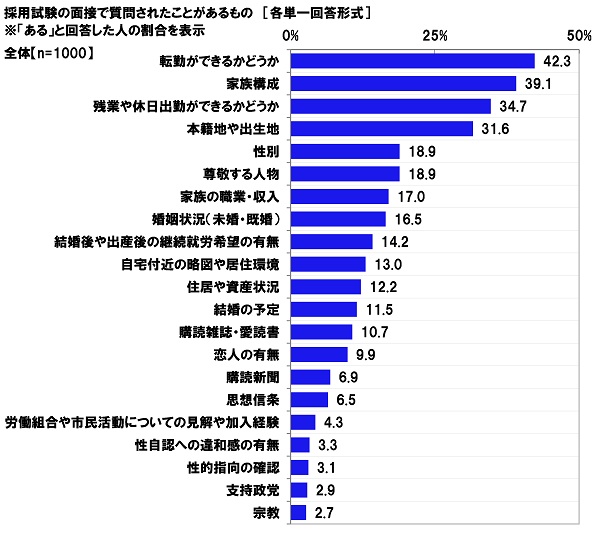 Questions being asked at job interviews. (One answer allowed)
Questions being asked at job interviews. (One answer allowed)*Shows percentages among those who answered “yes.”
Besides those questions, 16.5% were asked about their “marriage status (unmarried or married),” 14.2% were asked if they “planned on continuing work after marriage or giving birth,” and 11.5% were asked about their “marriage plans.” This shows that there were applicants who were asked about information related to marriage and giving birth. Furthermore, 3.3% of respondents were asked if “they felt something was wrong with their sexual identity,” 3.1% were asked to “confirm their sexual orientation,” 2.9% were asked about their “political affiliations,” and 2.7% were asked about their “religion.” Just like with application documents, companies should be warned about asking questions unrelated to aptitude or ability during the job interview itself. However, there are more than a few companies that are unaware that these questions are inappropriate.
Next, respondents were asked about their awareness about how inappropriate certain questions are. They were all presented with several possible job interview questions, and were asked if these were things that were appropriate for interviewers to ask. “Religion” was the most common answer at 66.5%, “political affiliation” was 61.9%, and “family’s job and income” followed at 52.6%. The lowest one was “person you respect” at 12.9%. All of the questions presented were ones that interviewers shouldn’t ask, however, there was a gap in respondents’ awareness of the inappropriateness of these questions.
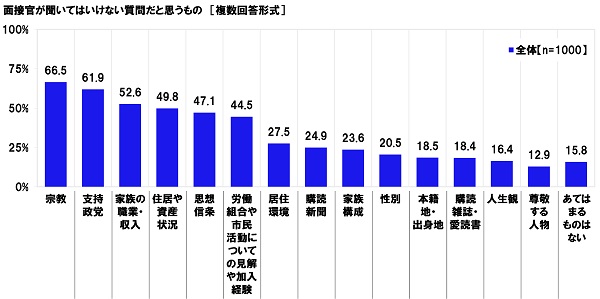 Questions applicants think interviewers shouldn’t ask. (Multiple answers allowed)
Questions applicants think interviewers shouldn’t ask. (Multiple answers allowed)Furthermore, for the 842 respondents who answered that they knew at least one question that interviewers shouldn’t ask, when asked how they knew about that question, most answered “I saw it on the internet,” at 35.0%. And 29.9% answered that “I was taught it at school,” while 16.9% answered that they “saw it on television.”
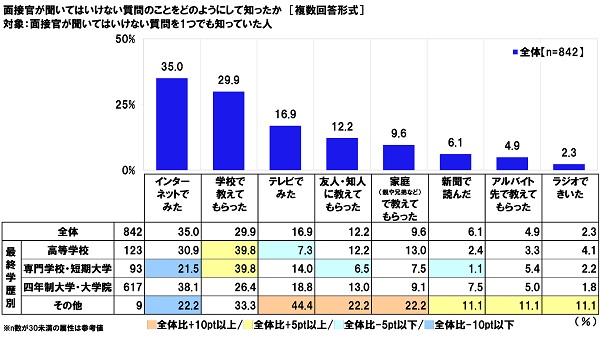 How applicants knew about questions interviewers shouldn’t ask. (Multiple answers allowed)
How applicants knew about questions interviewers shouldn’t ask. (Multiple answers allowed)Furthermore, in job interviews, 14.5% of respondents answered that they were asked questions or told remarks that they thought were inappropriate. Basically, many respondents said that they were told things regarding love and marriage such as “You’re a woman, so you’ll just quit after you give birth and start raising your child, won’t you?” and “Are you dating anyone? How long have you been single?” There were also comments regarding family, such as “I was asked about my family’s job, and they said that this industry was completely different, so why are you applying?” and there were a lot of comments about appearance, such as “you’re short” and “you’re fat.” Not only do a lot of employers ask questions unrelated to aptitude or ability, but there are also a lot of examples of clearly discriminatory remarks.
 Have you been asked questions or told remarks that you thought were inappropriate during job interviews? (One answer allowed)
Have you been asked questions or told remarks that you thought were inappropriate during job interviews? (One answer allowed)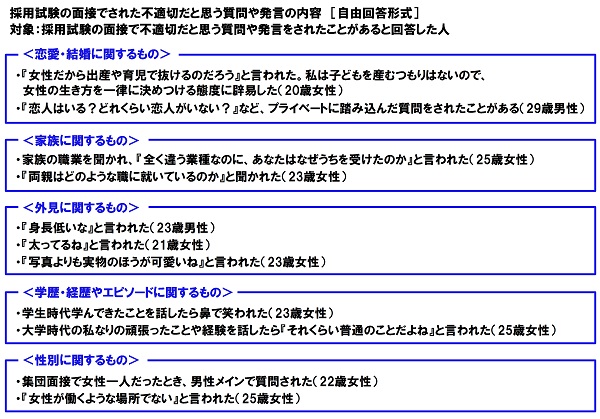 Things applicants were asked or told that they thought were inappropriate during job interviews. (Answers allowed in free format)
Things applicants were asked or told that they thought were inappropriate during job interviews. (Answers allowed in free format)Respondents: Those who answered they have been asked questions or told remarks that they thought were inappropriate.
The survey also took 145 people who were asked inappropriate questions and asked them about the industry in which these questions were asked. The most common answer was “the service industry and general business (restaurant, tourism, hotel, and others)” at 17.9%. “Manufacturing, metal (steel, shipbuilding, automobiles, nonferrous metals, metal machinery, general machinery, electrical equipment, transportation machinery, precision machinery) was at 16.6%, and “finance, insurance, and real estate” followed at 13.1%.
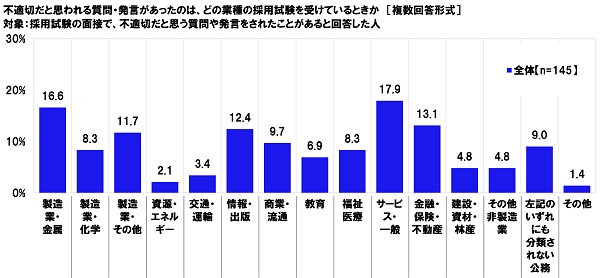 The industry in which inappropriate questions were asked or remarks were told during job hunting. (Multiple answers allowed)
The industry in which inappropriate questions were asked or remarks were told during job hunting. (Multiple answers allowed)For general questions about job hunting, 40.2% of respondents answered that “I felt companies were filtering candidates based on academic background.” When the respondents who answered as such are broken down by gender, 44.4% were men and 36.0% were women. When those who felt this way are broken down by their academic background, 25.2% were high school graduates, 18.9% graduated from junior colleges or vocational schools, and 46.4% graduated from 4-year colleges or graduate schools. For those who graduated from 4-year colleges or graduate schools, a lot of them felt that their school name had an influence on them being hired.
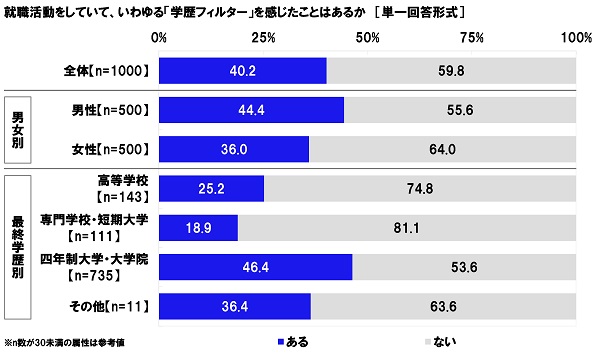 Have you felt that companies were filtering candidates based on academic background? (One answer allowed)
Have you felt that companies were filtering candidates based on academic background? (One answer allowed)Also, 28.3% of respondents answered that they “felt gender discrimination in their job hunt.” 283 respondents who answered that they felt this were asked about this, and the most common answer was “the company had plans to hire a fixed amount of men and women, and this number was different” at 43.8%. And 42.4% answered that “the job types companies were hiring for were different for men and women (men for career-track positions, women for clerical positions). 39.9% responded that companies were “hiring only men or only women.” According to the Equal Employment Opportunity Law, gender discrimination in hiring and employing workers is prohibited. However, more than a few respondents felt that they felt discrimination in the recruitment conditions.
 Have you felt gender discrimination in your job hunt? (One answer allowed)
Have you felt gender discrimination in your job hunt? (One answer allowed)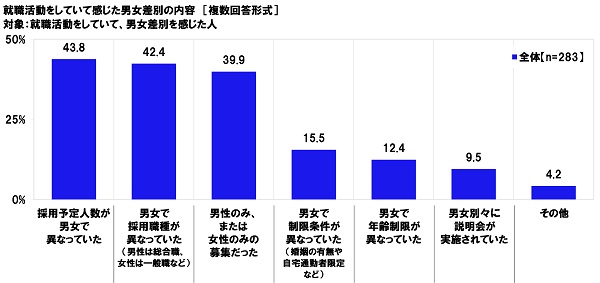 Things in which applicants felt were gender discrimination in job hunt. (Multiple answers allowed)Respondents: Those who felt gender discrimination in their job hunt.
Things in which applicants felt were gender discrimination in job hunt. (Multiple answers allowed)Respondents: Those who felt gender discrimination in their job hunt.The hiring process is a chance for candidates to learn about the companies they apply for. Job seekers can use these results as a guide in their job hunt to see if hiring managers are dealing with them appropriately.
This survey was conducted in 6 days from April 5th to April 10th, 2019. It was conducted through internet research.
[Related page] Employment and Selection Rules – Ministry of Health, Labor and Welfare



















